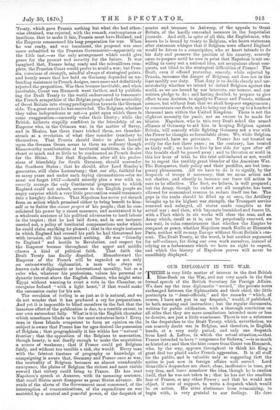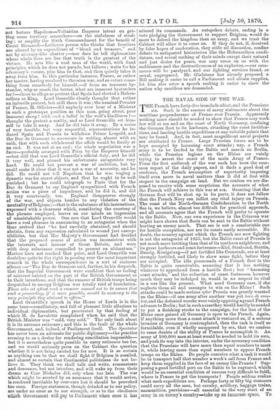OUR DIPLOMACY IN THE WAR.
THERE is very little matter of interest in the first British Blue-Book on the War, and not very much in the first formal speech of the British Secretary for Foreign Affairs. We dare say the true diplomatic "record," the private notes exchanged between the diplomatists and their chief, the little postscripts to " demi-officials," and the remarks " which, of course, I have not put in my despatch," would, if published, be both amusing and instructive ; but the regular documents, written for public edification, with a thorough conviction on all sides that they are mere manifestoes intended more or less to deceive, are just a little wearisome. There is not a reference in the despatches to the Draft Treaty, which, nevertheless, we can scarcely doubt was in Belgian, and therefore, in English hands, at a very early period, and only one despatch from Lord A. Loftus, in which the actual situation,—that France intended to have " vengeance for Sadowa,"—is so much as hinted at ; and then the hint comes from Count von Bismarck, who, by the way, appears throughout to think his King a great deal too placid under French aggression. It is all stuff for the public, and is valuable only as suggesting that the nation is just now in foreign affairs well served. Lord Granville's despatches are short, clear, inoffensive in tone, yet very firm, and leave somehow the idea, though he is caution. itself, that he was not taken in ; that he has not the smallest fear of France, or any other Power ; and that he would not object, if sure of support, to write a despatch which would be an action. His utter abstinence from sermonizing, to begin with, is very grateful to our feelings. He does. not lecture Napoleon—Voltairian Emperor intent on get- ting some territory somewhere—on the sinfulness of steal- ing ; or amplify the Sixth Commandment for the benefit of Count Bismarck—Lutheran person who thinks that frontiers are altered by an expenditure of "blood and treasure," and not by attorney-like chatter ;—nor does he tell diplomatists whose whole lives are lies that truth is the greatest of the virtues. He acts like a cool man of the world, with fixed principles, which he does not parade, but follows ; waits for his adversary's excuse, pins him to that, and then quietly takes it away from him. In this particular instance, France, or rather her master, having resolved to threaten war, and so extort some- thing from somebody for himself,—if from an innocent by- stander, why so much the better, what are innocent bystanders for I—chose to allege as pretext that Spain had elected a Hohen- zollern as King. Lord Granville clearly thought that rather an imbecile pretext, but still there it was ; the nominal Premier of France, M. Offivier—did anybody ever hear of a Minister in such a grotesque position as this man, going about, poor innocent sheep ! with such a belief in the wolf's kindliness ?- thought the pretext a reality, and so Lord Granville set him- self to take it away. And he did take it away. By a series of very forcible, but very respectful, representations he in- duced Spain and Prussia to withdraw Prince Leopold, and the Due de Gramont to asseverate in writing, almost with an oath, that with such withdrawal the affair would be finally at an end. It was not at an end ; the whole negotiation was a farce—probably arranged with Prim by the Emperor himself but still that was Lord Granville's official duty, and he did it very well, and pinned his unfortunate antagonists very hard. He could not prevent a war of ambition, but he could make it clear that it was not a war of necessity, and he did. He could not tell Napoleon that he was waging a dynastic war for secret objects, and that he ought to be well punished ; but he could telegraph to Paris that for the Due de Gramont to say England sympathized with French action was a piece of impudence, and he did it, and did it very courteously, too. England disapproves strongly of the war, and objects besides to any violation of the neutrality of Belgium ; —that is the substance of his instructions, expressed with a clearness which, considering the courtesy of the phrases employed, leaves on our minds an impression of unmistakable power. One sees that Lord Granville would have a real pleasure in announcing to an antagonist when the time arrived that "he had carefully abstained, and should abstain, from any expression calculated to wound just suscep- tibilities, but that Her Majesty's Government had decided that the proposed course of action was inconsistent with the interests and honour of Great Britain, and were with deep reluctance compelled to present an ultimatum." Matters have not reached that point, and Lord Granville was doubtless quite in the right in passing over the most important remark in the whole correspondence in a sort of ominous silence :—" The Duc de Gramont said, further, in his despatch, that the Imperial Government were confident that no feeling of mistrust existed on the part of the British Government as to their intentions, and that the rumour of British troops being despatched to occupy Belgium was totally void of foundation. Those who set afloat such a rumour seemed not to be aware that such a proceeding, if it were possible, would be contrary to the very principle they claimed to affirm."
Lord Granville's speech in the House of Lords is in the same tone—conciliatory, and full of pleasant little allusions to individual diplomatists, but penetrated by that feeling of which M. de Lavalette complained when he said that the British Minister was " cold, very cold." The only fault about it is its extreme reticence ; and this is the fault of the whole Government, and, indeed, of Parliament itself. The Spectator has never been an advocate for public diplomacy—the practice seeming to us a device for rendering conciliation impossible— but it is nevertheless quite possible to carry reticence too far, and we would seriously press on the Cabinet the question whether it is not being carried too far now. It is as certain as anything can be that we shall fight if Belgium is assailed, and almost as certain that Continental politicians do not be- lieve it. They think we shall talk and write, remonstrate and denounce, but not interfere, and will wake up from their dream as Czar Nicholas did, only when too late. The war which might be averted by an assurance that it would arrive, is rendered inevitable by over-care lest it should be provoked too soon. Foreign statesmen, though deluded as to our policy, are under no error as to our strength, or as to the obedience which Government will pay to Parliament when once it has uttered its commands. An outspoken debate, ending in rt vote pledging the Government to support Belgium, would do more to defend the kingdom than an army, and we trust the Cabinet will allow it to come on. If they do not, if, deceived. by false hopes of moderation, they stifle all discussion, confine debate to antiquated historiettes like the Hohenzollern candi- dature, and reveal nothing of their minds except their natural and just desire for peace, war may come on us with the- suddenness and the destructiveness of an explosion,—our com- merce will be paralyzed, and our fighting services found, as usual, unprepared. Mr. Gladstone has already proposed a Bill making it easier to call a Parliament and obtain supplies, let him also utter a speech making it easier to show the• nation why sacrifices are demanded.































 Previous page
Previous page